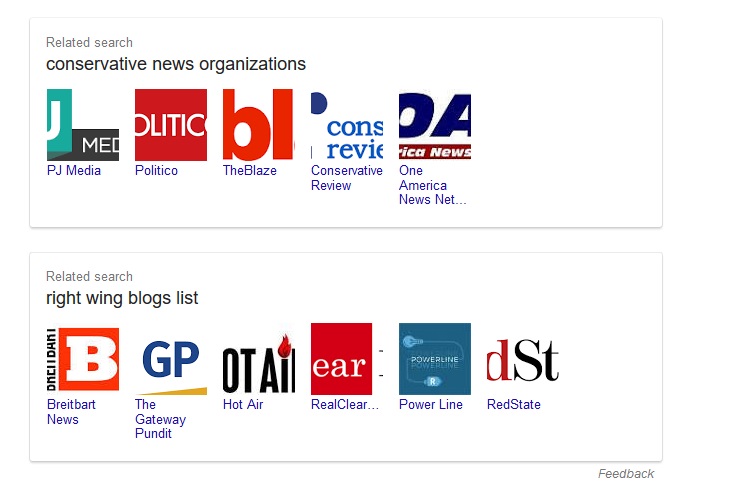Your cart is currently empty!

Google Bias
There have recently been claims that Google is showing political bias. The Economist did some number crunching. We checked out the websites being discussed, from the point of view of SEO. Slate talked with an AI expert. Big Think pointed out problems with the question. Essentially, everyone using evidence concluded that Google’s algorithm does not show political bias. Google had already denied the claims, but the rumors continued and Google has agreed to talk with Republican legislators on the subject.
I also saw something new when I Googled “Google bias” today: lists of right-wing blogs and news outlets, as shown in the screenshot above. Those were not there last time I made that search. Google may be making changes to appease those who feel that their views are not being fairly presented.
Lacking evidence that the algorithm is biased, complaints moved on to claim that people at Google are biased. This is easier to believe… but it doesn’t necessarily mean that the algorithm, which is not human, shares the prevailing political views that you might hear around the water cooler at Google and other tech companies.
Google CEO Sundar Pichai released a statement saying, “Recent news stories reference an internal email to suggest that we would compromise the integrity of our Search results for a political end. This is absolutely false,” Pichai wrote. “We do not bias our products to favor any political agenda. The trust our users place in us is our greatest asset and we must always protect it.”
Why do people believe Google is politically biased?
Quick answer: they don’t understand search. Google isn’t supposed to present a fair and unbiased selection of information and opinions. Their algorithm is designed to show the individual searcher the best result for their specific question. They show the least spammy, most relevant, most credible sources. That’s their job.
The Guardian made the point that the people who are complaining believe that established news organizations are politically biased against Trump. Google’s algorithm favors established news organizations. The complainers have set up a bit of a self-fulfilling prophecy. As Wired put it, “While Trump’s logic is specious, effectively countering it would require acceptance among his base that mainstream news sources like The New York Times are not, actually, the enemy of the people.”
Never mind politics
The New York Times made a different point. Since the vast majority of internet users search with Google, Google has a lot of control over what we see.
“When you get beyond the president’s claims, you come upon a set of uncomfortable facts — uncomfortable for Google and for society, because they highlight how in thrall we are to this single company, and how few checks we have against the many unseen ways it is influencing global discourse.”
Google has been called out for racism in the past. It looked into the issue and fessed up: the algorithm didn’t get enough data about anyone except white people. Between machine learning and a lack of diversity around the office, Google’s algorithm was learning stereotypes. Google has been working on this, as well as sexism in search results.
Note that Google didn’t deny this type of bias. Why not? Because it’s true. Users of Google should call out any bias they see. Google has historically responded to these concerns by acknowledging the problem and doing what they can to fix it.
How does this affect your website?
We work with clients along the political spectrum and we have never seen any evidence of political bias affecting Google rankings. We’ve also talked with people who are frustrated by their results in Google. Often they say that Google “hates” them, and complain that their competitors are getting higher rankings than they deserve.
It is certainly true that some companies and organizations get better results from Google than others. We can pretty much always identify the problem. It’s all about the websites. If your competitor has a modern, well-designed website with up to date code, frequent new content, and plenty of high quality links, they are likely to rank better than a company that doesn’t have those things. You can fix the problem by taking a leaf from that competitor’s book and working on the quality and freshness of your website.
If you’re not seeing the rankings you deserve, we can fix that for you. Contact us to get started.
by
Tags:

Leave a Reply